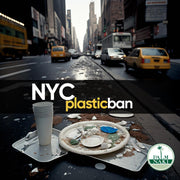New York City has recently taken a firm stance on the use of plastic in the restaurant and service industry by introducing a ban on disposable plastic plates, bowls, and utensils. This ban means more complains from customers who will be unpleasantly surprised when their take-out meals no longer come with disposable plastic cutlery and such. Tougher laws for restaurant owners means that these disposable items are no longer available as the default option, and instead must be requested by customers in order to be provided by the restaurant or food service.

This new policy has been met with some dissatisfaction among customers who rely on disposable dinnerware and cutlery every day when they visit the Big Apple. For many, the convenience and cost-effectiveness of using disposable tableware is a necessity due to the fast-paced lives they lead.
However, this decision is not without its reasons. Plastic waste has become a major environmental issue, and the use of non-recyclable single-use plastic items such as straws, plates, bowls, and utensils has been found to contribute significantly to the problem. It is estimated that if these items were to remain in use, an insurmountable amount of plastic waste would accumulate in the city by 2030 resulting in environmental chaos. an estimated 1.1 Million pounds of single-use disposable plastic items includes plastic straws, cutlery, plates, bowls, cups, and trays get thrown out each year in NYC*.
* Source: https://www.nyc.gov/office-of-the-mayor/news/191-19/mayor-de-blasio-signs-executive-order-end-city-reliance-single-use-plastic
By instituting this ban, the New York City Department of Sanitation hopes to reduce the amount of plastic waste generated in the city, and help citizens become more mindful of their plastic consumption. The Department has also published a set of laws on their website regarding the use of straws, splash sticks, and stirrers. These laws detail the various restrictions that businesses must adhere to when serving guests, such as the use of paper straws rather than plastic and the need to provide non-plastic utensils and dishes upon request.
What was only a buzzing rumor** a few months ago is now a reality for people living in the city that never sleeps. According to the above estimate, it never stops eating takeout either! perhaps this new law will help to curb the plastic crisis.
** Source: https://www.ny1.com/nyc/all-boroughs/politics/2022/12/12/city-council-wants-to-reduce-plastic-utensils-in-new-yorkers--takeout
The new plastic ban in New York City is a necessary step towards reducing plastic waste and creating a more sustainable environment. While it may be difficult for customers to adjust to the new policy, it is important to remember the positive impact it will have on the environment.
Plastic is everywhere.
It’s in the oceans, in our landfills, it’s all over our city street and it’s even in our stomachs.
The best way to avoid plastic is to use sustainable earth-friendly alternatives like Birchwood cutlery and areca palm leaf dinnerware, plates, and bowls such as those made by Palm Naki.
Top ten reasons to use Palm Naki’s earth-friendly disposable plates, bowls and cutlery:
-
Palm Naki plates and bowls are 100% natural, renewable, and biodegradable, making them an eco-friendly choice.
-
They are made from fallen areca palm leaves, so no trees are harmed in the production process.
-
Palm Naki plates and bowls are lightweight, sturdy, and cut-resistant.
-
They are heat-resistant and can normally handle temperatures from -20°F to 300°F.
-
The Birchwood cutlery is stylish and elegant, making it perfect for catered events or special occasions.
-
It is made from fast-growing sustainable Birchwood, meaning no trees are cut down in the process.
-
It is heat-resistant to 212°F and is disposable, so it’s easy to clean up after a meal.
-
Palm Naki provides a range of sizes and shapes to accommodate meals of all sizes.
-
The plates and bowls are microwave and oven-safe, so you can easily reheat leftovers.
-
Palm Naki products are BPA-free and meet the highest health and safety standards.


